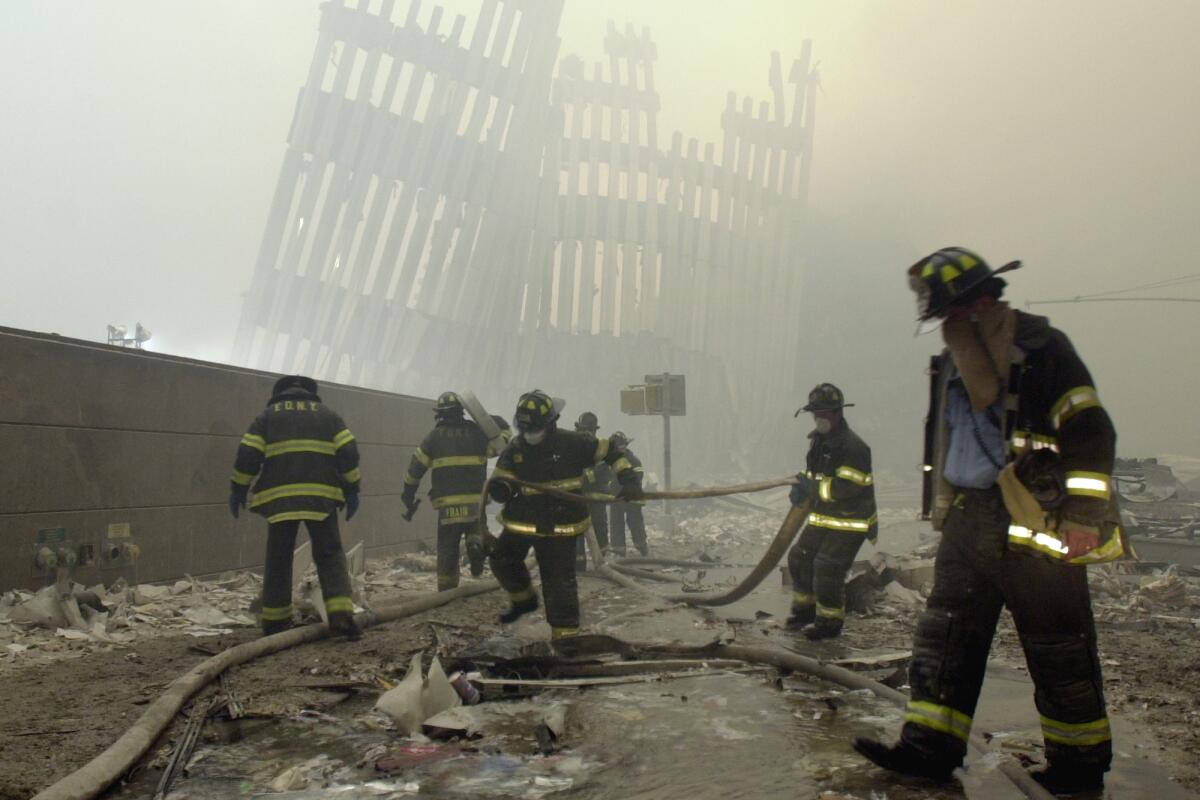Op-Ed: We hide an ugly truth when we call Sept. 11 ‘Patriot Day’

I received an email the other day from my employer, a public research university in the Midwest, announcing a wreath-laying ceremony on campus on Sept. 11. The event was described as being held “in recognition of the 20th anniversary of Patriot Day.”
I’ve never been comfortable with “9/11” to refer to the 2001 attacks. Giving the day a short, catchy name makes it easier to instrumentalize it, to use it to whip up nationalist fervor. I’ve never liked the term “Patriot Day” either, especially when used to refer not to each year’s anniversary of that day in 2001 but to the day itself, and I’ll tell you why.
Patriot Day has a complicated history. It’s not to be confused with “Patriots’ Day,” which was invented in 1894 to commemorate the Revolutionary War battles at Lexington and Concord. Patriot Day, on the other hand, wasn’t invented until 2002.
George Bush had declared Sept. 14, 2001, a “National Day of Prayer and Remembrance for the Victims of the Terrorist Attacks on September 11, 2001”; “Patriot Day” became law in December 2001. In 2009, Congress passed the Edward M. Kennedy Serve America Act, declaring every Sept. 11 a national day of service and remembrance. In signing it, Barack Obama combined the two days into “Patriot Day and National Day of Service and Remembrance,” a day he declared each year of his presidency. In 2017, his successor declared Sept. 8-10 “National Days of Prayer and Remembrance” and Sept. 11 “Patriot Day” (characteristically leaving out service).
It matters what we call things. Days of commemoration, while seeming to be all about looking backward, also look forward. How we remember our past as a nation helps shape how we think of ourselves today and so helps determine how we act as a nation tomorrow. The narratives we construct out of the events of the past, of the things we do and the things that happen to us, take shape out of such public observances and help determine our responses to future events.
Wolfgang Schivelbusch, in his 2003 book “The Culture of Defeat,” argued that the U.S. response to 9/11 was shaped in part by the legacy of the loss in Vietnam, writing, “it is possible that the destruction of September 11 uncovered the suppressed remains of Vietnam.” He wondered whether “America’s post-September 11 war fever is really a response to an earlier and unresolved defeat.”
Triumphalism is bred in the bone of America’s historical conception of itself. It is the nation that wins, and if it loses, it does so as innocent victim. Asserting otherwise — saying that there might be reasons for attacks against the U.S., reasons based on its own past actions — is not welcome, as Susan Sontag discovered after she did so in the pages of the New Yorker two weeks after 9/11.
This animating mythology of America the triumphant has been everywhere as the Biden administration has ended the 20-year war in Afghanistan. Current arguments about our leaving are at the center of the story. Whichever perspective wins will shape how we see ourselves now and into the future and so will shape how we act next time. Do we want another “unresolved defeat” to drive our leaders to send another generation to war?
Calling the anniversary of that day in 2001 “Patriot Day” proudly reprises the Bush administration’s response to the events of that day. Referring to the day itself as “Patriot Day” in this announcement just strikes me as perverse. It wasn’t “Patriot Day” when it started on a bright morning, and it wasn’t “Patriot Day” when it ended in smoke-filled darkness. It was just a day. People got out of bed, had breakfast, got on planes, went to work, died for reasons and for no reason.
My brother-in-law Andy, who worked on the 104th floor of the North Tower of the World Trade Center, was patriotic. That’s not why he died. He died because he went to work. His death shouldn’t have been used by neoconservative hawks to wage war, and it shouldn’t have been used by war profiteers like Halliburton and Blackwater to make money.
Two decades later, the wars in Iraq and Afghanistan, prosecuted in patriotism’s name, are finally over. As we watch the evacuation unfold and the blame be misassigned, as we hear the lies about who and what we care about and why we were there, maybe, for once, we can stop pretending. If we don’t want to make these mistakes again, if we don’t want any more forever wars, we should reconsider our response to Sept. 11, 2001, starting with how we remember it.
Samuel Cohen teaches English at the University of Missouri. He is the author of, among other books, “After the End of History: American Fiction in the 1990s.”
More to Read
A cure for the common opinion
Get thought-provoking perspectives with our weekly newsletter.
You may occasionally receive promotional content from the Los Angeles Times.










